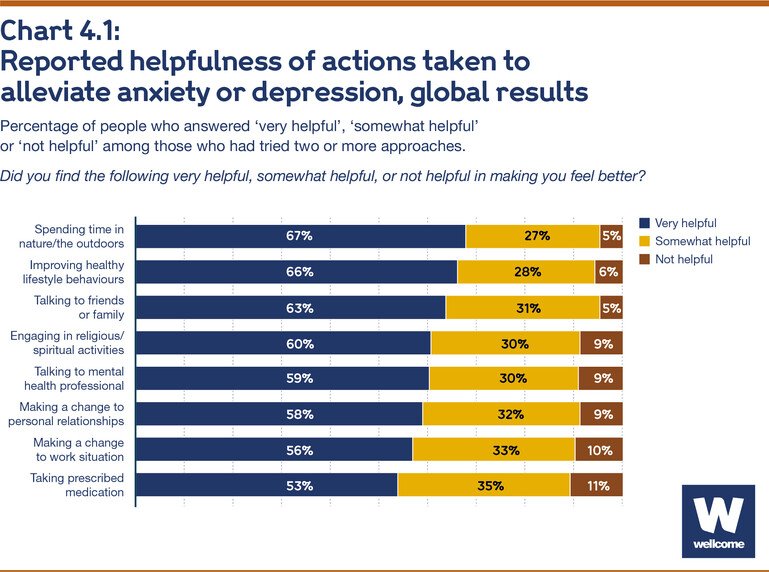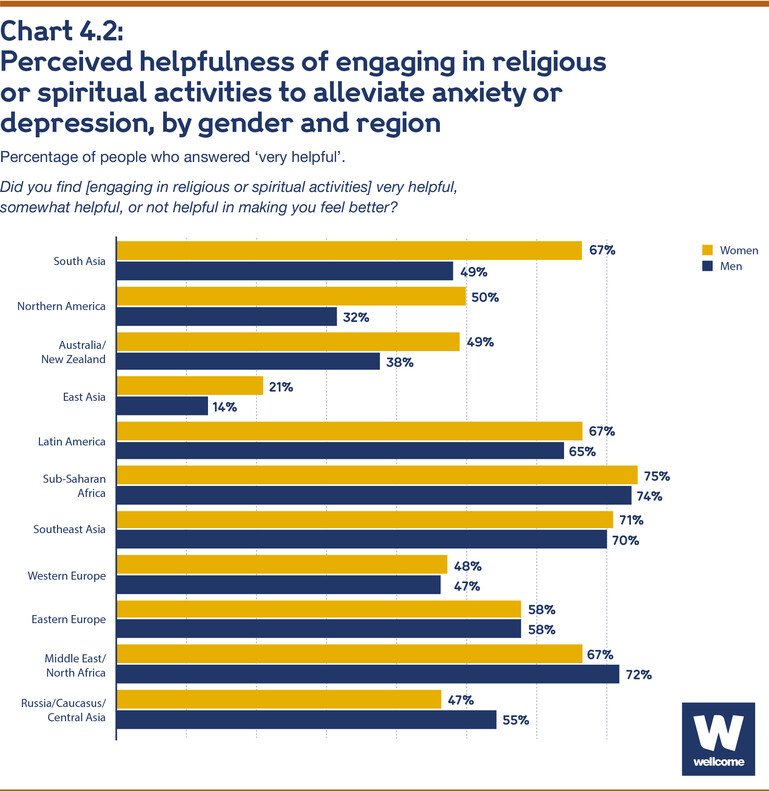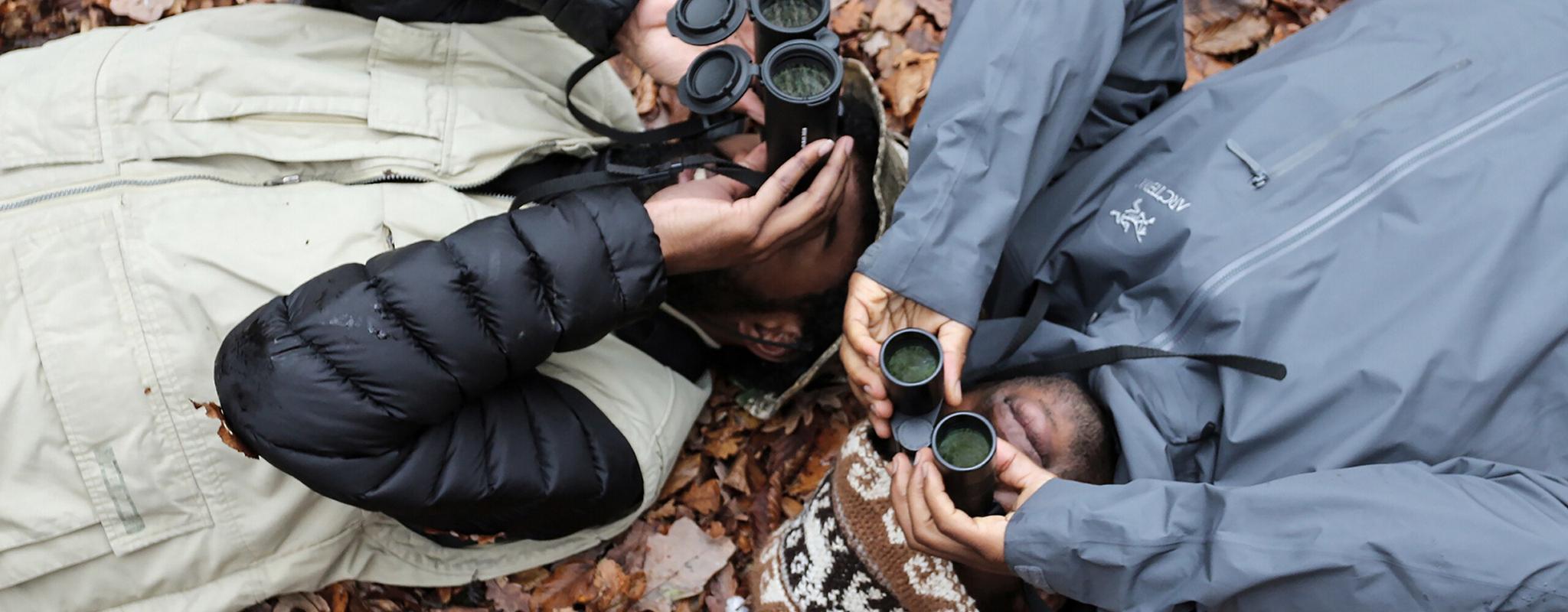Chapter 4: Perceived helpfulness of approaches to alleviating anxiety or depression
This is chapter 4 of the Wellcome Global Monitor 2020: Mental Health
Beyond measuring the prevalence of different approaches to alleviating anxiety or depression (i.e. being ‘so anxious or depressed that you could not continue your regular daily activities as you normally would for two weeks or longer’), this chapter provides insights into which methods people found most helpful by examining the question:
Did you find the following very helpful, somewhat helpful, or not helpful in making you feel better?
a. Talking to friends or family
b. Improving healthy lifestyle behaviours, such as exercise, sleep and diet
c. Spending time in nature/the outdoors
d. Making a major change in your personal relationships
e. Making a major change in your work situation
f. Taking medication as prescribed by a healthcare professional
g. Talking to a mental health professional
h. Engaging in religious or spiritual activities, or talking to a religious leader
These results provide an opportunity to study the perceived effectiveness of each approach among different types of people in different geographic, economic and cultural circumstances and to learn more about the conditions in which specific approaches are most likely to be effective.
The most common approaches used to alleviate anxiety or depression worldwide were also the most likely to be considered ‘very helpful’
People who have experienced anxiety or depression and taken at least two of the eight actions listed in the survey were asked how helpful they had found the methods they had tried to be. As Chart 4.1 shows, for each of the eight, more than half who had tried an approach (53%-67%) found it helpful, and relatively few (11% or less) said it was not helpful. It is important to recognise that these are the subjective assessments of people who used each approach rather than clinical evaluations of their effectiveness. Moreover, caution is needed when drawing any inferences from a comparison of the reported helpfulness of different approaches since the comparison is not like for like. The same people didn’t use all the approaches, and the reported satisfaction could be influenced as much by the expectations of the different people using them as by the experience of using the approach itself.
Chart 4.1: Reported helpfulness of actions taken to alleviate anxiety or depression, global results
Percentage of people who answered ‘very helpful’, ‘somewhat helpful’ or ‘not helpful’ among those who had tried two or more approaches.
Did you find the following very helpful, somewhat helpful, or not helpful in making you feel better?

Notably, the most common actions taken worldwide were also the most likely to be considered very helpful by those who have taken them: spending time in nature, improving healthy lifestyle behaviours and talking to friends or family.
Views on how helpful people found different approaches varied by region
As shown in Figure 4.1, the likelihood of those who have experienced anxiety or depression saying the action they took to feel better was helpful varied between regions. Overall, people who had experienced such conditions in Sub-Saharan Africa and Southeast Asia were particularly likely to say most approaches were very helpful, while those in East Asia, Northern America and Australia/New Zealand were among the least likely to respond this way. In East Asia (predominantly China), none of the actions listed in the survey were deemed very helpful by the majority of those who have experienced anxiety or depression.
Figure 4.1: Map showing the approaches people found most helpful for alleviating anxiety or depression, by region*
Interact with the data in more detail via the chart below
It is worth highlighting that the proportion who found talking to a mental health professional very helpful ranged from highs of 71% in Latin America and Southeast Asia and 70% in Sub-Saharan Africa to a low of 39% in East Asia. The latter figure is due primarily to results from China, where 35% responded this way – though percentages from Hong Kong (25%) and Taiwan (33%) were also among the lowest in the world.
*See Appendix A for complete results by region – Table A.4.
Gender differences in views on the helpfulness of religious or spiritual activities existed in several regions
At the global level, there were no significant differences between men and women regarding their likelihood of using any one approach to feel better, and, similarly, there were few gender differences concerning the perceived helpfulness of each action. The one exception was that women worldwide were somewhat more likely than men to say that engaging in religious or spiritual activities was very helpful – 64% compared with 56%. More notable gender differences again emerged by region, as illustrated in Chart 4.2:
- Women in South Asia (predominantly India), Northern America and Australia/New Zealand who have experienced anxiety or depression were considerably more likely than men to say they had found engaging in spiritual or religious activities very helpful.
- Women were significantly more likely than men to say they had found talking to a mental health professional very helpful in Northern America (57% compared with 43%, respectively) and Australia/New Zealand (55% compared with 40%).
- Women in four regions – East Asia (predominantly China), Northern America, Eastern Europe and Russia/Caucasus/Central Asia – were more likely than men to say they had found spending time in nature very helpful.
Chart 4.2: Perceived helpfulness of engaging in religious or spiritual activities to alleviate anxiety or depression, by gender and region
Percentage of people who answered ‘very helpful’.
Did you find [engaging in religious or spiritual activities] very helpful, somewhat helpful, or not helpful in making you feel better?

A closer look at what predicts perceived helpfulness
As with the analysis of approaches to feeling better, deeper analysis helps untangle the effects of various demographic and geographic variables on the perceived helpfulness of each action. The following factors best predict whether those who have experienced anxiety or depression found a given approach very helpful when controlling for other variables:
Region
- People in Sub-Saharan Africa and the Middle East/North Africa were most likely to say engaging in religious/spiritual activities was helpful.
- Spending time in nature/the outdoors was most likely to be considered helpful in Latin America and the Middle East/North Africa.
Gender
- Men were less likely than women to find engaging in religious/spiritual activities very helpful.
Age
- People aged 50 and older were more likely to consider taking prescribed medication and spending time in nature/the outdoors to be helpful.
Age at which people first experienced anxiety or depression
- Those who were older when they first experienced these conditions were more likely to say talking to friends or family was very helpful.
Location
- Making a change to personal relationships was more likely to be seen as very helpful by those living in city suburbs than those living in city centres or rural areas.
- People in rural areas were more likely than those living in urban areas to consider talking to friends or family as very helpful.
Education
- The perceived helpfulness of improving healthy lifestyle behaviours and talking to a mental health professional increased with education.
Within-country income
• People in their country’s top income quintiles were more likely to consider making a change to their work situation to be very helpful. This within-country income difference is present in low-, middle- and high-income countries.
Commonly paired approaches
The following approaches were most commonly associated with one another:
- talking to a mental health professional and taking prescribed medication.
- engaging in religious/spiritual activities and talking to friends or family.
- talking to friends or family and making a change to one’s personal relationships.
- spending time in nature/the outdoors and improving healthy lifestyle behaviours.
- making a change to one’s work situation and making a change to one’s personal relationships.
Findings concerning how external factors influence the perceived helpfulness of an approach are based on a series of multivariate regression models that used people’s likelihood of saying they found each action ‘very helpful’ as the dependent variable. See Appendix A for a complete discussion of the analysis and outcomes.
